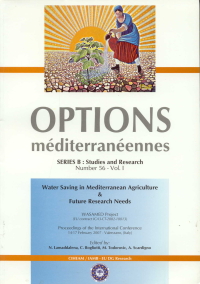| Article précédent | p. 249-259 | Article suivant |
Irrigation scheduling calendars development and validation under actual farmers' conditions in arid regions of Tunisia
This paper presents a prototype of irrigation calendars that can help farmers in their irrigation scheduling under the arid conditions of southern Tunisia. The potato crop cultivated under drip irrigation on private wells is used as a case study. The methodology considers commonly available climatic data, crop and soil characteristics, and information on local irrigation practices. It calculates daily soil water balance by means of a spreadsheet program for Excel, developed according to the methodology formulated by Allen et al. (1998). Calendars are developed for three cropping seasons of potato and guide the user in the irrigation scheduling throughout the growing season. Their simplicity makes them useful tools for a better utilization of the saline water for irrigation in arid Tunisia. The validation of developed irrigation scheduling calendars in commercial farms was an integrated part of this paper. Three farmers of the Médenine area were provided by the calendars and asked to use them for irrigation scheduling on a portion of the cropped land while continuing to use their traditional irrigation practices. For comparison, drip irrigation, Spunta variety, sandy soils and standard cultivation practices were used in all field plots. Irrigation waters come from wells having an ECi of 3.25, 3.60 and 4.80 dS/m respectively for the three farms. Yield, water supply and soil salinity were monitored in each experimental plot over two cropping seasons, spring and autumn. Results show that the proposed calendar have improved yield by 21-33 percent and 31-36 percent respectively for spring and autumn crops and allowed an important water savings. Water use efficiency (WUE) was also dramatically improved. Under the proposed scheduling, the WUE varied between 8.9 and 11.7 kg/m3 against 4.6 and 7.1Kg/ m3 obtained by farmers for spring production and 7.2 and 9.1 kg/m3 against 3.7 and 4.9 Kg/ m3 for farmers in autumn. The use of irrigation calendars not only allowed substantial improvements in yield, water savings and WUE but also a better control of soil salinization. The yield and irrigation water gains should incite farmers to adopt the suggested irrigation calendars in their usual production practices for potato cultivated under drip irrigation on private wells for a better utilization of saline irrigation water.
- [ Afficher ]
- [ Télécharger ]
- [ Exporter la citation ]
Vous pouvez télécharger la citation au format :
- [ Imprimer ]
-
Mots-clés
CALENDRIER DES IRRIGATIONS, EFFICACITE, IRRIGATION, RENDEMENT DES CULTURES, SALINITE, SOLANUM TUBEROSUM, TUNISIE, UTILISATION DE L'EAU, ZONE ARIDECiter cet article
Nagaz K., Masmoudi M.M., Ben Mechlia N. Irrigation scheduling calendars development and validation under actual farmers' conditions in arid regions of Tunisia. In : Lamaddalena N. (ed.), Bogliotti C. (ed.), Todorovic M. (ed.), Scardigno A. (ed.). Water saving in Mediterranean agriculture and future research needs [Vol. 1]. Bari : CIHEAM, 2007. p. 249-259. (Options Méditerranéennes : Série B. Etudes et Recherches; n. 56 Vol.I). Proceedings of the International Conference WASAMED Project (EU contract ICA3-CT-2002-10013), 2007/02/14-17, Valenzano (Italy). http://om.ciheam.org/om/pdf/b56_1/00800117.pdf



